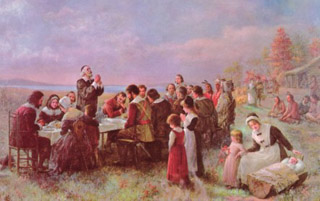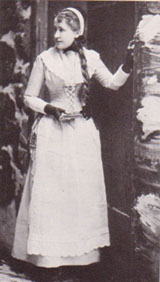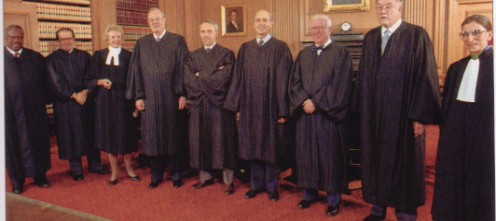|
● Religious
Liberty
● Protestants
in the United States
● CathoLics
● Three
Faiths
● Religious
Diversity
● American
Character of Religion
Text
 |
|
Worship
by Early Protestant Settlers
|
 From
Chapter 1, we came to know that American mainstream culture was
developed from what is known as "WASP"
culture and that people who settled in the 13 North American
colonies that would become the United States were mostly Protestant
believers. From
Chapter 1, we came to know that American mainstream culture was
developed from what is known as "WASP"
culture and that people who settled in the 13 North American
colonies that would become the United States were mostly Protestant
believers.
Religious Liberty
 |
|
A
Puritan Girl
|
 By
the middle of the 18th century, many different kinds of Protestants
lived in America. Lutherans
had come to America from Germany. The
Dutch Reformed Church flourished in New York and New Jersey.
Presbyterians
came from Scotland and Huguenots
from France.
Congregationalists, as the Puritans
came to be called, still dominated in Massachusetts and the neighboring
colonies, an area which came to be known as New England. By
the middle of the 18th century, many different kinds of Protestants
lived in America. Lutherans
had come to America from Germany. The
Dutch Reformed Church flourished in New York and New Jersey.
Presbyterians
came from Scotland and Huguenots
from France.
Congregationalists, as the Puritans
came to be called, still dominated in Massachusetts and the neighboring
colonies, an area which came to be known as New England.
 Although
the Church of England
was an established
church in several colonies, Protestants lived side by side in relative
harmony, and they influenced each other. The
Great Awakening of the 1740s, a "revival" movement
that sought to breathe new feeling and strength into religion, cut
across the lines of Protestant religious groups, or denominations. Although
the Church of England
was an established
church in several colonies, Protestants lived side by side in relative
harmony, and they influenced each other. The
Great Awakening of the 1740s, a "revival" movement
that sought to breathe new feeling and strength into religion, cut
across the lines of Protestant religious groups, or denominations.
 At
the same time the works of John
Locke were becoming known in America. John
Locke reasoned that the right to govern comes from an agreement
or "social contract" voluntarily entered into by free
people. The Puritan experience in forming congregations
made this idea seem natural to many Americans. Taking it out of
the realm
of social theory, they made it a reality and formed a nation. At
the same time the works of John
Locke were becoming known in America. John
Locke reasoned that the right to govern comes from an agreement
or "social contract" voluntarily entered into by free
people. The Puritan experience in forming congregations
made this idea seem natural to many Americans. Taking it out of
the realm
of social theory, they made it a reality and formed a nation.
 It
was politics and not religion that most occupied Americans' minds
during the War of Independence and for years afterward. A few Americans
were so influenced by the new science and new ideas of the
Enlightenment
in Europe that they became deists,
believing
that reason teaches that God exists but leaves man free to settle
his own affairs. It
was politics and not religion that most occupied Americans' minds
during the War of Independence and for years afterward. A few Americans
were so influenced by the new science and new ideas of the
Enlightenment
in Europe that they became deists,
believing
that reason teaches that God exists but leaves man free to settle
his own affairs.
 Many
traditional Protestants and deists could agree, however, that, as
The Declaration of Independence states, "all men are
created equal, that they are endowed
by their creator with certain unalienable
rights," and that "the
laws of Nature and Nature's God" entitled them to form a new
nation. Among
the rights that the new nation guaranteed, as a political necessity
in a religiously diverse society, was freedom of religion. Many
traditional Protestants and deists could agree, however, that, as
The Declaration of Independence states, "all men are
created equal, that they are endowed
by their creator with certain unalienable
rights," and that "the
laws of Nature and Nature's God" entitled them to form a new
nation. Among
the rights that the new nation guaranteed, as a political necessity
in a religiously diverse society, was freedom of religion.
 The
First Amendment to the Constitution of the United States
forbade the new federal government to give special favors to any
religion or to hinder the free practice, or exercise, of religion.
The Unites States would have no state-supported religion. In
this way, those men who formulated
the
principal
tenets
of
the newly established political system hoped to insure that diversity
of religious belief would never become the source of social or political
injustice or disaffection. But Protestant churches kept
a privileged position in a few of the states. Not
until 1833 did Massachusetts cut the last ties between church and
state. The
First Amendment to the Constitution of the United States
forbade the new federal government to give special favors to any
religion or to hinder the free practice, or exercise, of religion.
The Unites States would have no state-supported religion. In
this way, those men who formulated
the
principal
tenets
of
the newly established political system hoped to insure that diversity
of religious belief would never become the source of social or political
injustice or disaffection. But Protestant churches kept
a privileged position in a few of the states. Not
until 1833 did Massachusetts cut the last ties between church and
state.
 The
First Amendment insured that American government would not meddle
in religious affairs or require any religious beliefs of its citizens.
But did it mean that the American government would have nothing
at all to do with religion? Or did it mean that government would
be religiously neutral, treating all religions alike? The
First Amendment insured that American government would not meddle
in religious affairs or require any religious beliefs of its citizens.
But did it mean that the American government would have nothing
at all to do with religion? Or did it mean that government would
be religiously neutral, treating all religions alike?
 |
|
A
Priest in the Army
|
 In
some ways, the government supports all religions. Religious groups
do not pay taxes in the United States. The armed forces pay chaplains
of all faiths. Presidents and other political leaders often
call on God to bless the American nation and people. Those people
whose religion forbids them to fight can perform other services
instead of becoming soldiers. In
some ways, the government supports all religions. Religious groups
do not pay taxes in the United States. The armed forces pay chaplains
of all faiths. Presidents and other political leaders often
call on God to bless the American nation and people. Those people
whose religion forbids them to fight can perform other services
instead of becoming soldiers.
 But
government does not pay ministers'
salaries or require any belief—not even a belief in God—as a condition
of holding public office. Oaths are administered, but those who,
like Quakers,
object to them, can make a solemn affirmation, or declaration, instead. But
government does not pay ministers'
salaries or require any belief—not even a belief in God—as a condition
of holding public office. Oaths are administered, but those who,
like Quakers,
object to them, can make a solemn affirmation, or declaration, instead.
 |
|
The
Supreme Court Justices
|
 The
truth is that for some purposes government ignores religion and
for other purposes it treats all religions alike—at least as far
as is practical. When disputes about the relationship between government
and religion arise, American courts must settle them. The
truth is that for some purposes government ignores religion and
for other purposes it treats all religions alike—at least as far
as is practical. When disputes about the relationship between government
and religion arise, American courts must settle them.
 American
courts have become more sensitive in recent years to the rights
of people who do not believe in any God or religion. But in many
ways what Supreme
Court Justice
William O. Douglas wrote in 1952 is still true. "We
are a religious people," he declared, "whose institutions
presuppose a Supreme Being." American
courts have become more sensitive in recent years to the rights
of people who do not believe in any God or religion. But in many
ways what Supreme
Court Justice
William O. Douglas wrote in 1952 is still true. "We
are a religious people," he declared, "whose institutions
presuppose a Supreme Being."
 In
the early years of the American nation, Americans were confident
that God supported their experiment in republican government. They
had just defeated Great Britain—probably the most powerful nation
in the world at that time. Protestant religion and republican forms
of government, they felt, went hand
in hand. In
the early years of the American nation, Americans were confident
that God supported their experiment in republican government. They
had just defeated Great Britain—probably the most powerful nation
in the world at that time. Protestant religion and republican forms
of government, they felt, went hand
in hand.
Previous Page Next
Page
|

